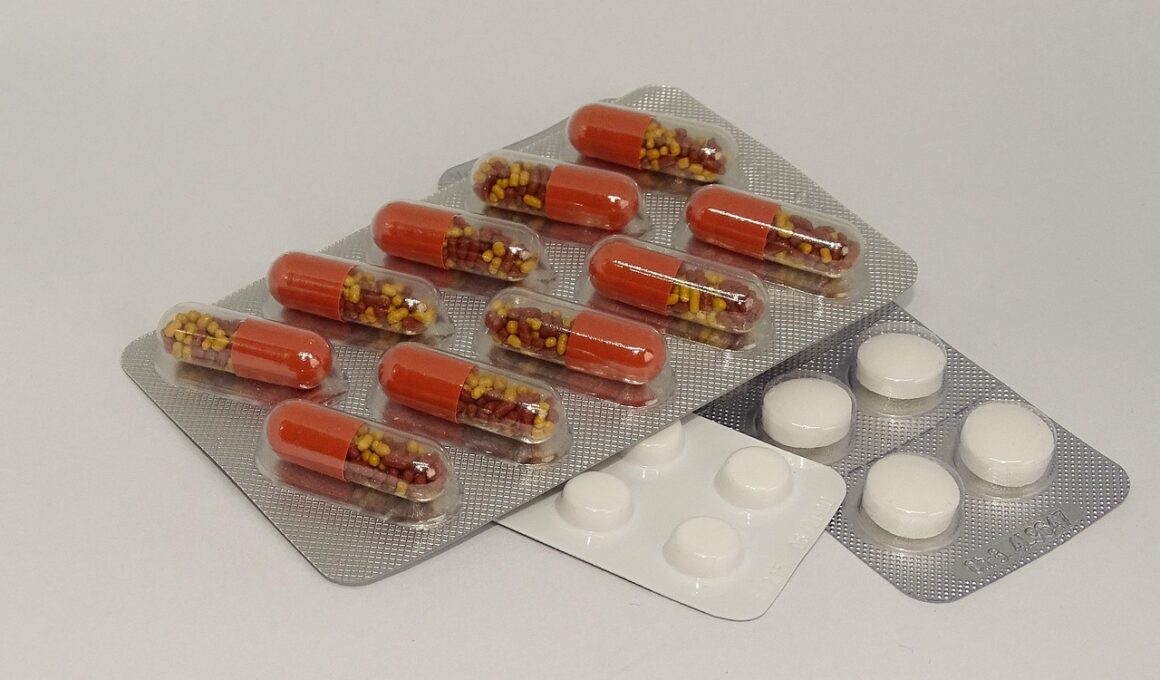Adolescents’ Use of Diet Pills and Supplements: Risks and Awareness
Eating disorders among adolescents have surged dramatically in recent years, linked closely to societal pressures regarding body image. An increasing number of adolescents feel compelled to achieve an ideal body shape, which often leads them to unhealthy practices, including the use of diet pills and supplements. These substances are marketed as quick solutions to weight loss, providing misleading promises that often entice young individuals experiencing insecurities about their body image. However, these pills may come with substantial health risks. Adolescents are particularly vulnerable because their bodies are still developing physically and mentally. Parents and educators must engage in open conversations about the potential dangers associated with these products, emphasizing that no quick fix will replace a balanced diet and a healthy lifestyle. Building body positivity and self-acceptance is critical in countering feelings of inadequacy that drive young individuals toward such extreme measures. Comprehensive education about nutrition, body diversity, and resilience against societal pressures is essential in forming a protective barrier against the allure of diet pills and supplements.
Diet pills and dietary supplements often present a mask of safety and effectiveness, but many come with dangerous side effects that can be harmful to adolescents’ health. Common ingredients found in these products include stimulants and herbal extracts, which can lead to increased heart rates, anxiety, and sleep disturbances. Understanding these side effects is crucial for both young people and their guardians. Most adolescents lack the requisite knowledge to assess the ingredients and potential risks associated with these aids. It’s vital for parents to educate their children about what constitutes a healthy lifestyle based on balanced nutrition and regular physical activity. Furthermore, health professionals should play a key role in guiding conversations about body image and healthy habits. They can provide credible information on the risks of unregulated diet pills marketed without appropriate health endorsements. Encouraging teenagers to seek knowledgeable advice rather than following trending diet culture will help them make informed decisions regarding their health. Promoting self-confidence and awareness about healthy living and nutrition will greatly reduce the chances of adolescents resorting to harmful weight-loss methods while nurturing a healthy body image.
The Psychological Impact of Diet Pills
The appeal of quick weight loss can mask a multitude of psychological impacts associated with diet pills and supplements. Adolescents striving for an unattainable ideal often undergo extreme emotional fluctuations, caught in a relentless cycle of body dissatisfaction, leading to potential eating disorders. Diet pills can exacerbate these emotions by creating false hope regarding body image change. Many young individuals become compulsive users, leading to an obsession with weight loss that overshadows their mental health. Adolescents may experience feelings of guilt and embarrassment if they fail to achieve their desired weight loss goals, fueling a dangerous cycle of depression and anxiety. Encouraging a healthy mindset is crucial in combating this phenomenon. Schools should consider implementing programs that focus on body positivity, presenting diverse body types and educating students on the impact of media representations on self-esteem. Parents should be vigilant, offering support and understanding while creating a home environment where healthy discussions about body image can thrive. Promoting awareness regarding the psychological effects of diet pills and stressing the importance of mental health can empower adolescents to make healthier choices.
Many adolescents overlook the fact that diet pills and supplements are not scientifically proven to be effective, often causing premature financial burdens. Young individuals can become easily swayed by aggressive marketing tactics, presenting these measures as necessities for achieving desired body shapes. Advertisements often feature testimonials and celebrity endorsements that create unrealistic expectations. Parents may find it essential to discuss the fallacies surrounding diet pills proactively, as their children may be influenced by peers or social media. By fostering critical thinking around marketing messages, parents can guide their teenagers to question product safety and efficacy. Additionally, individuals frequently dismiss the nutritional value of whole foods in favor of quick fixes, leading to a poor understanding of healthy eating practices. Through educational initiatives, such as workshops or information sessions, communities can equip adolescents with knowledge regarding balanced diets and encourage them to explore practical lifestyle choices. Ultimately, establishing skepticism around commercialized weight-loss solutions will help reduce reliance on potentially harmful substances while promoting healthy alternatives.
Alternatives to Diet Pills
Promoting healthy alternatives to diet pills and supplements is central to mitigating the allure of quick weight loss solutions among adolescents. A blend of exercise, healthy eating, and wellness practices should be emphasized instead. Encouraging participation in physical activities such as sports, dance, or even regular family outings can help adolescents develop a healthier relationship with their bodies. Furthermore, teaching the importance of a well-rounded diet rich in fruits, vegetables, proteins, and whole grains can foster a healthy lifestyle without resorting to diet pills. When adolescents understand how various foods contribute to their overall health and well-being, they are less likely to seek shortcuts. Community initiatives can enhance these messages, offering cooking classes that empower young individuals with the skills to prepare nutritious meals. Additionally, practices like mindfulness and cognitive-behavioral techniques help address negative body image sentiments. When adolescents can manage stress without turning to diet pills, they foster a sense of self-love rather than self-criticism. Gaining knowledge about holistic and sustainable health practices can be transformational, steering adolescents away from the dangerous allure of diet pills.
Understanding the fiberous differences in diets is importantly considered while talking about weight management. Adolescents should learn the fundamentals of nutrition rather than relying on diet pills as supplements. Whole foods provide essential nutrients, offering satiety and better digestive health, while diet pills rarely offer these benefits. Additionally, the normalization of body diversity should be encouraged, allowing teenagers to appreciate various body shapes and sizes. Body diversity enables individuals to view health beyond numerical statistics like weight or BMI. Engaging with diverse role models who embrace their natural bodies can inspire adolescents to embrace their uniqueness, mitigating the pressure to conform. Programs focusing on body confidence and media literacy can cultivate this mindset while reducing reliance on harmful products. Providing access to fitness activities that celebrate movement rather than weight loss can have lasting positive impacts on young people’s views of health. Participating in supportive communities can also foster friendships centered around shared interests rather than weight-related goals. Collectively, emphasizing self-acceptance, understanding nutrition, and celebrating body diversity can help adolescents navigate the complexities of body image and weight loss without resorting to harmful supplements.
Conclusion: Empowering Adolescents
It is crucial for society to unite in empowering adolescents in their approach toward body image and health. Open dialogue among parents, educators, and health professionals is vital to creating an environment where adolescents feel safe discussing issues related to weight and beauty standards. Encouraging awareness about the risks associated with diet pills and promoting healthy alternatives lays a foundation for healthier future generations. School programs on body image and wellness can create supportive spaces for adolescents to share their experiences, fostering resilience against external pressures. Additionally, media campaigns that spotlight body positivity and diversity can help reshape perceptions of beauty. Adolescents need role models and communities that celebrate individuality while emphasizing the importance of mental and physical health. Equipping young people with knowledge about nutrition, exercise, and overall wellness will enable them to make informed choices rather than succumbing to risky diet pills. By collectively tackling these issues, we can pave the way for a healthier narrative surrounding adolescence and foster a generation that values health over the harsh norms of societal beauty.
Through awareness, education, and community engagement, the conversation surrounding eating disorders can shift toward more positive outcomes. By nurturing a supportive environment, we can guide adolescents away from dangerous trends. Initiatives emphasizing health and well-being nurtured within schools and social circles can create lasting change. Awareness of the underlying psychological struggles accompanying the pressure to conform to unrealistic body standards is essential. We must work toward reducing stigma and encouraging open discussions surrounding mental health in relation to body image. Equally, collaboration between families, healthcare providers, and educational institutions will enhance outreach efforts. Building resilience and fostering self-esteem among adolescents should be central to any program aimed at preventing eating disorders. Ultimately, it is our collective responsibility to educate and empower adolescents to understand their bodies better, appreciate their uniqueness, and cultivate a holistic approach to health.





